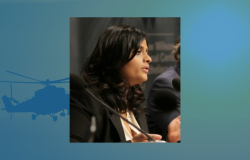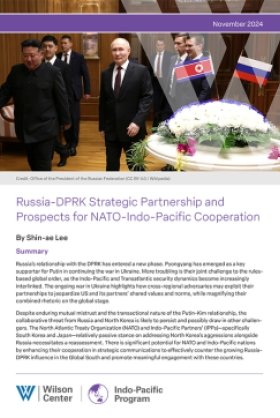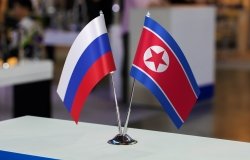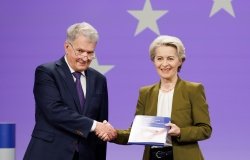Germany Says 'No': The Iraq War and the Future of German Foreign and Security Policy
A discussion with Dieter Dettke. Commentator: Thomas Kleine-Brockhoff, Senior Director for Policy Programs at the German Marshall Fund of the United States
Overview
On Friday, February 22nd the West European Studies Program held a discussion with Dr. Dieter Dettke, Visiting Fellow at the American Institute for Contemporary German Studies and Adjunct Professor at Georgetown University's Security Studies Program, on "Germany Says 'No' The Iraq War and the Future of German Foreign and Security Policy."
Dr. Dettke began the discussion by noting that the book is written from the perspective of defensive realism. The focus of his research has been examining why the U.S.-German relationship had soured so much during the run up to the Iraq War and what does the future hold for relations between the two nations? Dettke's emphasis is on the Schroeder years as Chancellor and the "68 generation" of German leaders who Dettke describes as "much more self-confident and independent, modern, and urban oriented." This generation's focus has not been the collective memory of the Second World War but that of the Vietnam era and the upheaval of the 1960's.
This new independence and self-confidence has been demonstrated in the direction that the Schroeder government has taken German foreign policy and in his government's relationship with the Bush administration. Dettke notes key differences in what had been the traditional German foreign policy of the Cold War years. This re-orientation included calling for German participation in Kosovo and leading the SDP and Green party coalition towards a much more proactive stance within NATO and in the peacekeeping process. Additionally, Schroeder wanted to move Germany away from the more multilateral orientation that had been a central pillar of its security and defense policy since the 1950's, and after September 11th, 2001 this was demonstrated with the decision to allow German participation in the War on Terror and subsequent war in Afghanistan.
Dr. Dettke argues that while Schroeder wanted a more independent, proactive foreign policy, Germany remained hamstrung by its militaristic past and a segment of the population, both in and out of the government, which had demonized the use of force in any situation. He points out that, despite Germany being allowed to maintain a force of 370,000 troops, current levels are around 249,000 members of which 35,000 are considered combat ready troops. Additionally, Dettke argues that the civilian power paradigm is not sustainable and gives the situation in the Balkans as an example with Germany not being able to adequately deal with regional conflicts such as Kosovo effectively without U.S. intervention. Finally, Dettke notes that this paradigm has led to a non-reliable position in Afghanistan, an example being Canadian forces calling for German assistance with little help given due to the Bundestag mandate on the use of force. He warns that this may have grave implications for the future of the NATO alliance as an effective security and defense organization.
Dettke then went on to describe how the German "No" position on the Iraq War of 2003 developed from a strategic attitude of the SDP-Green coalition which had been decided as early as July 30th, 2002. The author argues that the Schroeder government made two key mistakes in this period which set the stage for bad relations with Washington. This included the preemptive "no" and early opposition to the U.S. campaign and an underestimation by the Schroeder government of the strength of American power. This would lead to the subsequent decision to develop a counter position along with the Chinese and Russians to check the Bush administration's position.
Further damage to U.S.-German relations was caused by members of the American administration, specifically then Secretary of Defense Donald Rumsfeld, who escalated the rhetoric to a point where it became almost impossible for Schroeder to make concessions toward the United States position. Dettke also notes that a key misconception among many in Washington was that German opposition to the war had been an election ploy by the Schroeder government, but in actuality it was a much deeper and more fundamental disagreement.
Finally, Dettke describes how Germany actually had two Iraq War policies. The first included a public opposition to the U.S. invasion but behind the scenes the Schroeder government continued to lend vital logistical support for coalition forces, including air rights, intelligence cooperation, and the protection of key sea lanes in the Gulf region.
Dr. Dettke concluded by stating that the Iraq War did not prove to be a structural break in U.S.-German relations as some have suggested but a periodic crisis such as Suez in 1956 or the decision by France to withdraw from NATO military command in 1966. Dettke also suggested that German relations with Russia as well as bilateral relations with China and India may be key factors affecting U.S.-German cooperation in the future.
Commentator Thomas Kleine-Brockhoff, Senior Director for Policy Programs at the German Marshall Fund of the United States, followed Dettke's remarks by arguing that the Schroeder years did in fact represent a paradigm shift in German foreign policy, but one that the United States should not fear. Kleine-Brockhoff noted that there is a school of thought which suggests that Germany should become a great European power once again and that Dettke makes an argument for this position in his work, but Schroeder may have reached too far too soon, thereby isolating himself.
Kleine-Brockhoff goes on to describe how much of Schroeder's policies were based on the goal of greater independence from the United States with a more European based foreign policy, and the Iraq War debate is when Germany finally found its voice in promoting this goal. But Kleine-Brockoff also questions Dettke's belief that this new, great power status is achievable. He points out that, if using the Ken Waltz's requirements for great power status such as increasing population, greater wealth, and stronger military capability, Germany currently meets none of these requirements. There also appears to be very little public will for an increase international commitment by the German public, and the quest for a permanent seat at the U.N. Security Council also an meets significant opposition, due to the over representation of Europe while Asia and Africa are under-represented despite significant growth.
Kleine-Brockhoff concludes by arguing that "Germany has actually done quite well by acting as if it had less power and influence than it actually does." Additionally, relations with Russia will also be a key factor in the discussion as well. The traditional German foreign policy position of maintaining an "equidistance" between Washington and Paris has now apparently shifted for some Germans to equidistance to between Washington and Moscow, and Schroeder continues to warn of the need to refrain from the classic anti-Russian rhetoric of the past. According to Kleine-Brockhoff, this re-orientation towards the east, especially with Putin's roll back of democratic reforms in Russia, may be a dangerous path to follow in the future.
In subsequent exchanges, Dettke acknowledges that his use of the term "great European power" was a mistake. He would in future use the term "major European Power" to draw a distinction of Germany's last century of expansionism.
Drafted by Matt Starling
Hosted By

Global Europe Program
The Global Europe Program is focused on Europe’s capabilities, and how it engages on critical global issues. We investigate European approaches to critical global issues. We examine Europe’s relations with Russia and Eurasia, China and the Indo-Pacific, the Middle East and Africa. Our initiatives include “Ukraine in Europe” – an examination of what it will take to make Ukraine’s European future a reality. But we also examine the role of NATO, the European Union and the OSCE, Europe’s energy security, transatlantic trade disputes, and challenges to democracy. The Global Europe Program’s staff, scholars-in-residence, and Global Fellows participate in seminars, policy study groups, and international conferences to provide analytical recommendations to policy makers and the media. Read more
Thank you for your interest in this event. Please send any feedback or questions to our Events staff.











